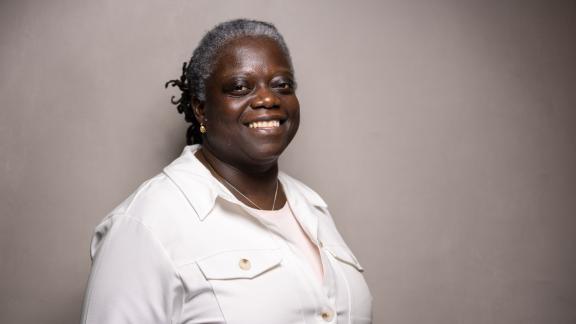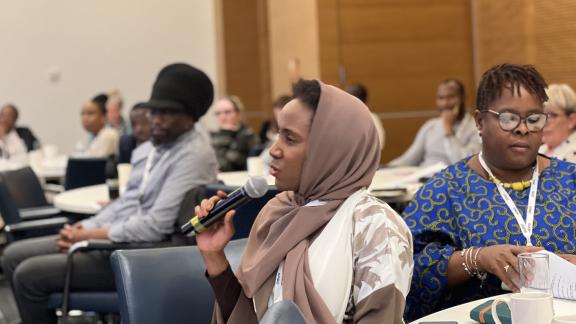Why we’re looking afresh at anti-racism and zero tolerance

Like many other NHS trusts, we aspire to be an anti-racist organisation.
Also like many others, we have strengthened our position on racism following the killing of George Floyd in 2020 and the subsequent Black Lives Matter movement.
In 2020, we volunteered to be one of the six early adopter sites for the Patient-Carer Race Equality Framework (PCREF) and have been working on implementing it since then.
We have also taken steps to combat racism against staff. Our overall stance has, we thought, been clear: zero tolerance.
What that means in practice, however, has rightly been challenged, and we are now beginning to interrogate this idea much more closely.
A vulnerable state
As a mental health trust, we encounter patients when they are at their most vulnerable. This includes those using our crisis helpline, our community services and our inpatient services.
In all of these settings, our staff regularly face racist abuse from patients, and the national staff survey results show that both violence and discrimination from patients has increased over the last year. Black colleagues bear the brunt of these attacks, but Asian staff and those from other backgrounds are also deeply affected.
It is not enough to just outline values in words; they must also be backed up by something tangible which genuinely improves conditions on the ground
The question of how to respond to patients in this vulnerable state is complicated by a number of factors, and we know that the complexity that surrounds these debates has slowed action in the past, where it may have been seen as simply a part of the job.
That time is over.
It is not enough to just outline values in words; they must also be backed up by something tangible which genuinely improves conditions on the ground. This is what we are now working towards.
Mental capacity
We know through feedback from staff how important it is to face up to the difficult questions that this problem poses, and that inaction is simply not acceptable.
The first issue when responding to a patient who is presenting with racist behaviour is the question of that individual’s mental capacity.
An overly simplistic way of viewing this would be to consider that anyone who is psychologically unwell or suffering from a mental health condition is no longer fully responsible for their actions and therefore not accountable.
For example, at the far end of the scale, when thinking of a person with late-stage dementia approaching the end of life, this may be true.
But being unwell or having a mental health condition does not necessarily mean a lack of capacity, and awareness and control over one’s actions can also be episodic.
We also know that for some service users, racist behaviour is part of a personal outlook and something that is wholly separate to their mental illness. Racism, as we know, exists throughout society.
Actions and consequences
In terms of consequences, we need to see that there is a continuum, and in our own work we are seeking to examine what that may look like in practice, informed where necessary by our clinicians and their assessments of the mental state of a patient at the time of a specific incident.
The second challenge is around what those consequences should look like.
It is taken for granted, and outlined in the NHS Constitution, that patients have a right to care. However, the constitution also notes that abusive and violent behaviour could result in being refused access to NHS services.
I am not aware of any trust that has seriously considered the practicalities of attempting to refuse care on these grounds.
We also know that our staff feel a Hippocratic duty to provide care. Even for staff responding to our helpline where there is a sense of distance between themselves and the service user, we know that there is a reluctance to end a call even when faced with abuse, due to fears of the person coming to harm.
None of this means that we should abandon the idea of making a robust response. And crucially, this should not only mean providing support for a member of staff, but also seeking to challenge the person responsible, though depending on where the incident sits on the continuum of capacity, the balance of support versus consequences will vary.
We have convened a senior group within the trust to work out what all of this means in practice.
Ideas and improvements
One of the most promising ideas, is a restorative justice approach where a conversation between a member of staff and a patient is set-up and mediated, and where the effects of their racist abuse can be brought into the open.
In terms of reporting of incidents too, we are seeking to make the process quicker and less onerous for the member of staff involved, and something to be shared and supported by wider colleagues who witness it. We have run a campaign to educate all staff on our expectations when they witness racist behaviour.
We expect to move away from the language of zero tolerance to one that is instead unapologetically anti-racist
With support, we are also getting better. Racist incidents are now escalated to management and viewed as an issue to be mitigated through safe staffing levels, with the aim being to deter them from occurring in the first place and ensuring teams have the capability to safely challenge them quickly and effectively when they do.
As we seek to resolve many of these questions – and it is important to note that we do not see this as a destination to be reached, but an ongoing process – we expect to move away from the language of zero tolerance to one that is instead unapologetically anti-racist, with a clear and consistent application of what this means backed up by actions across the whole hierarchy and breadth of our organisation, from board level down.
And I expect – and welcome – our whole body of staff to continue to hold us to account.
Evelyn Asante-Mensah OBE is chair of Pennine Care NHS Foundation Trust and a member of the Mental Health Network's board.



